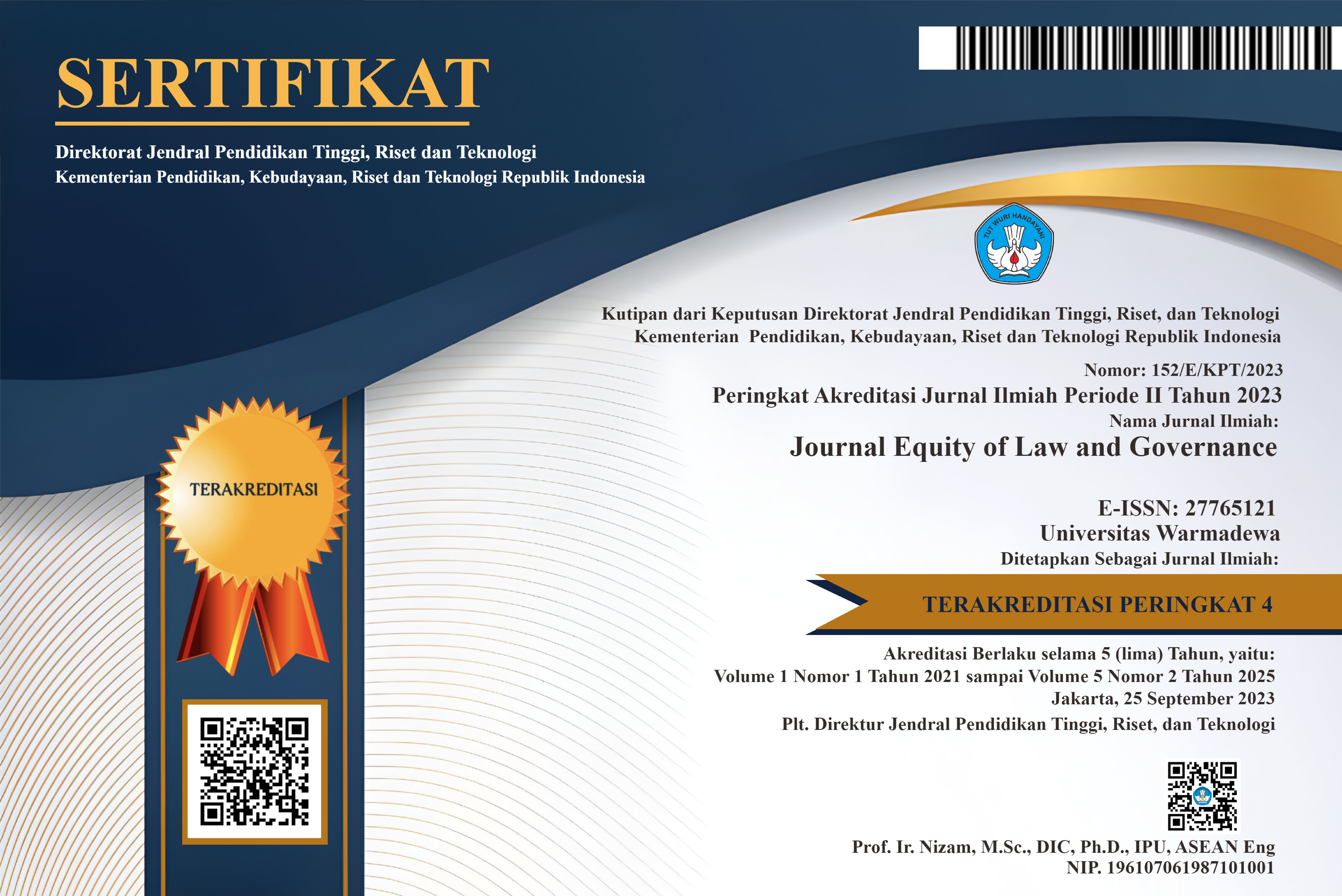LEGAL FRAMEWORK FOR THE POST-PANDEMIC TOURISM IN BALI
Abstract
Tourism can only thrive when customers feel welcome. Especially in the time of the restart of the tourism industry after the pandemic, there may be an opportunity for the Indonesian tourism industry to correct undesirable developments in the past in order to promote a type of tourism that is sustainable, honest and effective. This concerns economic and strategic marketing decisions, such as addressing specific target groups for tourism services, but also legal framework conditions. Corresponding legal framework conditions can be found particularly in consumer protection law and competition law, but also in the hierarchy between Indonesian federal law and local law. From the point of view of a foreign observer, the paper would like to highlight some legal aspects that could be important for a rebalancing of tourism.
References
Aan Jaelani. (2017). Halal Tourism Industry in Indonesia: Potential and Prospects. SSRN Electronic Journal, 7(3), pp. 1-19.
Bono Budi Priambodo. (2018, July). Positioning Adat Law in the Indonesia´s Legal System: Historical Discurs and Current Development on Customary Law. Udayana Journal of Law and Culture, 2(2), pp. 140-164.
Directive 2005/29/EC of the European Parliament and of the Council of 11 May 2005 concerning unfair business-to-consumer commercial practices in the internal market. (2005). Retrieved from https://eur-lex.europa.eu/legal-content/EN/TXT/?uri=celex%3A32005L0029
Ensuring the Quality and Sustainability of Bali Tourism in Accordance with the Vision of Nangun Sat Kerthi Loka Bali. The Governor of Bali Issues Governor Regulation Number 28 of 2020. (2020, 10 10). Retrieved 6 16, 2021, from https://balitopnews.com/read/202008100002/ensuring-the-quality-and-sustainability-of-bali-tourism-in-accordance-with-the-vision-of-nangun-sat-kerthi-loka-bali-the-governor-of-bali-issues-governor-regulation-number-28-of-2020.html
Griffiths , J. (1986). What is Legal Pluralism? The Journal of Legal Pluralism and Unofficial Law, 18(24), pp. 1-55.
Indonesian Supreme Court, Verdict No 37 P/HUM/2017 (Indonesian Supreme Court 2017).
Koos, S. (2015). Core Elements of Social Justice from the Competition Law Perspective. In Universitas Islam Negeri Jakarta, & DAAD Jakarta (Ed.), Proceedings for DAAD International Workshop "Justice for All", (pp. 1-14). Jakarta.
Koos, S. (2017). Ethic and Social Responsibility in the Competition Law. International Conference on Developing a Legal System to Promote Social Welfare. Jakarta: Faculty of Law, Trisakti University.
Koos, S. (2021). Consistency and Law Comparison in Consumer Protection Law Design in the Light of the Socially Responsible Market Economy Approach. 1st International Conference on Social Science and Humanities. Rajshahi/Bangladesh (April 2-3, 2021).: in publishing process.
Mirza Satria Buana. (2016). Living Adat Law, Indigenous Peoples and the State Law: A Complex Map of Legal Pluralism in Indonesia. International Journal of Indonesian Studies, 1(3), pp. 104-119.
Mukti Fajar, Dyah Mutiarin, & Reni Budi Setianingrum. (2019). Disruptive Innovation on Competition Law: Regulation Issues of Online Transportation in Indonesia. European Journal of Economics and Business Studies, 5(2), pp. 23-37.
Mukti Fajar, Dyah Mutiarin, & Reni Budi Setianingrum. (2020). Regulation Concepts for Disruptive Innovation: New Policy Perspective for Online Transportation Industry. International Journal of Economics and Business Administration, VIII(4), pp. 223-237.
Sara I Made, Agus Suman, Sasongko, & Dwi Budi Santoso. (2015). Role of Desa Adat in Tourism Development in Bali (Case Study of Bali as Tourist Destination). Journal of Economics and Sustainable Development, 6(4), pp. 117-126.
Shidarta, S. (2013). Formal Legal Sources in Indonesian Law. Jakarta: UPT Penerbitan Universitas Tarumanagara.
Shidarta, S., & Koos, S. (2019). Introduction to a Social-Funcional Approach of the Indonesian Consumer Protection Law. Jurnal Ilmu Hukum Veritas et Justitia, 5(1), pp. 40-79.
Sunaryati Hartono. (1991). Politik hukum menuju satu sistem hukum nasional. Bandung: Alumni.
Visi "NANGUN SAT KERTHI LOKA BALI". (2018, 9 8). Retrieved 6 16, 2021, from https://disdikpora.baliprov.go.id/nangun-sat-kerthi-loka-bali/
Windscheid, B. (9th ed. 1906). Lehrbuch des Pandektenrechts. Leipzig: Literarische Anstalt Rütten&Lönig.
 Abstract viewed = 237 times
Abstract viewed = 237 times
 PDF downloaded = 224 times
PDF downloaded = 224 times













